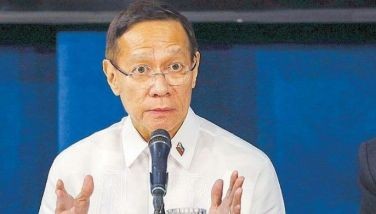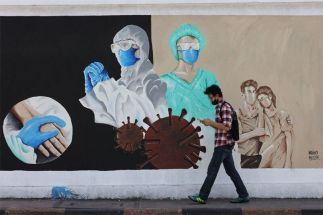Besieged

At Malabon City, the testing program for COVID-19 was cut down to half. This is a direct consequence of the failure of PhilHealth to meet its P700-million obligation to the Philippine Red Cross, the humanitarian institution that set up the free testing program for our poor communities.
?PhilHealth, the agency principally responsible for delivering the universal health care program, has been besieged by accusations of rampant fraud. So-called “whistleblowers” have claimed various “mafias” at work even as evidence for such has so far been scarce.
One senior officer of the agency claims PhilHealth will be bankrupt in less than two years. That horrifying claim has yet to be actuarially validated.
Another officer made the earthshaking claim the P154 billion of the agency’s funds was lost to fraud. If that claim were true, that would be too large an amount to evade the Commission on Audit’s radar. The state auditors have no report of anything near that scale of fraud.
There is evidence the procurement process for upgrading the agency’s IT system is probably flawed. But we must be reassured that no money has yet been disbursed for that program.
P154 billion is a headline-grabbing amount. The challenge now is for the accusers to prove their claims.
To be sure, there is enough evidence of fraud happening in an agency dispensing so much cash. But probably not in the scale now being imagined.
Recall those instances in the past where thousands were coopted to have cataract surgeries so doctors and hospitals reimburse more. The same goes for flu patients whose malaise was upgraded to pneumonia for the same reason. And then, most recently, we saw the scandal involving the use of dead people’s accounts to fund the dialysis treatment of the living.
?From these instances of very real scandals, it seems clear no fraud could happen without the cooperation of doctors, hospital staff and bureaucrats. The scale of fraud now captivating the attention of our legislators would involve a “mafia” in the tens of thousands, including the very frontliners we now proclaim as heroes. The possibility of that happening under all our noses seems remote.
? In fact, the main issue raised by private hospitals against PhilHealth is the delay in reimbursements running into the tens of millions. Those delays, due mainly to inefficient processes, threaten to disrupt the delivery of medical services by private hospitals – pretty much in the same way delay in reimbursements now disrupts the work of Red Cross testing facilities.
?There are, to be sure, many corporate practices that deserve closer scrutiny. The case rates and the practice of advancing forthcoming reimbursements have been put in question. We need a certain level of management expertise to correct these supposed weak practices.
?More than that, it is now clear, PhilHealth is ill designed for the missions it must accomplish in the context of the Universal Health Care Law and in the midst of a pandemic. There is a design flaw here somewhere. It is the task of our legislators to identify a better organizational architecture to fulfill the larger missions PhilHealth is now asked to do.
?As the trustee agency for universal health care, PhilHealth handles a vastly larger amount of funds. It needs the best actuarial expertise that could be hired on a public sector pay scale. It needs a vastly enhanced information system to monitor the millions of beneficiaries under its care. It needs the most advanced auditing procedures to keep things in check. It needs a nimble bureaucracy able to respond to the urgent needs of its beneficiaries.
?Sure, if fraud happened, we should prosecute the perpetrators. But the larger task for our legislators is to redesign this vital agency at the soonest so that the work it must do be done with utmost efficiency.
?This larger task, unfortunately, will not grab headlines and titillate the scandalmongers.
Lynching mob
?If our politicians had their way, we might have had ten health secretaries in quick succession during the course of this pandemic. Each would come and go through the revolving door without making any headway in the learning curve.
?It is easy to grab headlines by calling on Health Secretary Francisco Duque to resign, blaming him for whatever shortcomings might be imagined about our notoriously weak public healthcare system or for whatever scandal is contrived about any agency under the Health Department’s oversight. Calling for an official’s resignation is the easiest thing to do. The talent search for a substitute in the middle of a health emergency is most difficult.
?None of us will probably agree with all of Duque’s decisions all of the time. But all of us will agree that he has the toughest job one could imagine in the eye of a public health crisis.
?Duque is probably doomed to do this job. Even as he is reluctant to publicly engage his critics or to pull stunts to win the public’s favor, he cannot now back away from his mounting responsibilities.
?His father, formerly also secretary of health, was the architect of Medicare. Public health is a legacy.
?Duque holds a thankless job. Ex-officio, he sits on the boards of about 67 agencies and government corporations. That is a stretch even in non-pandemic times.
?He has the advantage of institutional memory, having served at this post before. He knows how bureaucracies work. He has kept the leaking dike that is our public healthcare system from breaking.
?President Duterte has kept the partisan lynching mob at bay and reiterated his confidence in Duque.
- Latest
- Trending
























